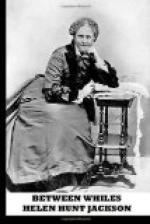“If I can’t live in my own house,” cried the angry woman, “I’ll go back to my father and tend bar again; and how’ll you like that?”
“It is purely immaterial to me, Madame,” replied Willan, “where you live. I merely wish to know your address, that I may forward to you the quarterly payments of your annuity. I should think it probable,” he added with an irony which was not thrown away on Jeanne, “that you would be happier among your own relations and in the occupations to which you were accustomed in your youth.”
Jeanne was not deficient in spirit. As soon as she had ascertained beyond a doubt that all that Willan had told her was true, and that there was no possibility of her ever getting from the estate anything except her annuity, she packed up all her possessions and left the house. No fine instinct had restrained her from laying, hands on everything to which she could be said to have a shadow of claim,—indeed, on many things to which she had not,—and even Willan himself, who had been prepared for her probable greed, was surprised when on returning to the house late one evening he found the piazza piled high from one end to the other with her boxes. Jeanne stood by with a defiant air, superintending the cording of the last one. She anticipated some remonstrance or inquiry from Willan, and was half disappointed when he passed by, giving no sign of having observed the boxes at all, and simply lifting his hat to her with his usual formality. The next morning, instead of the public vehicle which Jeanne had engaged to call for her, her own coach and the gray horses she had best liked were driven to the door. This unexpected tribute from Willan almost disarmed her for the moment. It was her coach almost more than her house which she had grieved to lose.
“Well, really, Mr. Willan,” she exclaimed, “I never once thought of taking that, though there’s no doubt about its being my own, and your father’d tell you so if he was here; and the horses too. He always said the grays were mine from the day he bought them. But I’m much obliged to you, I’m sure.”
“You have no occasion to thank me, Madame,” replied Willan, standing on the threshold of the house, pale with excitement at the prospect of immediate freedom from the presence of the coarse creature. “The coach is your own, and the horses; and if they had not been, I should not have permitted them to remain here.”
“Oh ho!” sneered Jeanne, all her antagonism kindled afresh at this last gratuitous fling. “You needn’t think you can get rid of everything that’ll remind you of me, young man. You’ll see me oftener than you like, at the Golden Pear. You’ll have to stop there, as your father did before you.” And Jeanne’s black eyes snapped viciously as she drove off, her piles of boxes following slowly in two wagon-loads behind.




